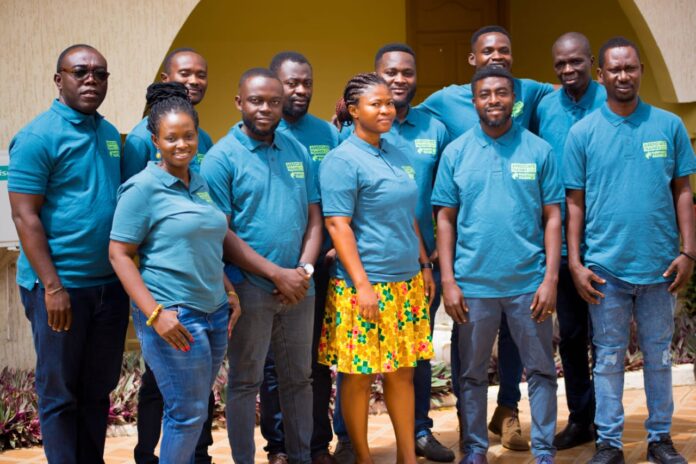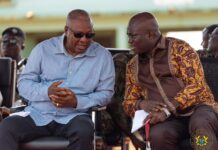The Rainforest Alliance is an international non-profit organization working at the intersection of business, agriculture, and forests to make responsible business the new normal. They are building an alliance to protect forests, improve the livelihoods of farmers and forest communities, promote their human rights, and help to mitigate and adapt to the climate crisis across the globe.
As part of the Alliance core mandate, they work with third-party authorized certification bodies (CBs) who provide auditing services for their certificate holders.
The organization additionally provides support to these certification bodies (CBs) and their auditors to be able to audit the Rainforest Alliance standard and add value to the auditor’s work which is a priority for the Rainforest Alliance team in Ghana and West Africa at large.
Speaking at 3-day training organized here in Accra which focused on Traceability, Assess and Address (A&A), Integrated Pest Management, Deforestation and Encroachment, and Auditing Ethics, Manager, Certification Partner Support for Rainforest Alliance, Leslie Adwoa Agyapong explained that the 2020 certification program introduces numerous innovations to ensure that certification is more context-specific and data-driven across cocoa growing communities and companies.
According to her, continuous improvement is a key mantra of the certification program and the Rainforest Alliance will continue to provide targeted training to authorized certification bodies operating in Ghana and Nigeria to foster improved audit quality.
“This year’s training was based on priority themes or topics for Ghana as well as the training needs assessment carried out by the Quality of Implementation (QoI) team in West Africa.
“The drive for these certification bodies training is to ensure that all auditors are updated and abreast with the Rainforest Alliance requirements before the commencement of the full certification and 2023/2024 audit season for 2023.
“We have systems in place to assess and address issues of child labor, forced labor, workplace violence and harassment, as well as discrimination.
“The Rainforest Alliance introduced the Assess and Address (A&A) system as part of their organizational tool.
“For it to function properly, we need to commit to eradicate human right abuses and communicate policies, procedures regarding human right abuses, assess their risk and implement mitigation measures at all levels of implementation within the supply chain and help remediate identified cases” she said.
Manager, Team Member Monitoring for Rainforest Alliance, Maurice Amooh, explained that as part of efforts to support their auditors to better assess the traceability system of certificate holders (CHs), their organization has developed a traceability monitoring and guidance tool to serve as a guide for auditors.
“The tool guides auditors on what to check and which traceability documents to prioritize during the audit.
“The tool is unique in that it’s the first of its kind to be used by auditors; it’s also the first time Rainforest Alliance is introducing such a tool to the certification bodies in Ghana” he mentioned.
The Officer, Standards & Assurance West and Central Africa for Rainforest Alliance, Dickson Baan, explained that this training will help to strengthen the CBs auditors and certifiers capacity in terms of RA’s new requirements and competence to deliver quality audits for the certification programme ahead of the full season.
“It helps forester’s closer collaboration with stakeholders, especially the CBs and their auditors who are Rainforest Alliance’s eyes in the field.
“I believe that with the auditor’s competence and confidence enhanced they are able to deliver quality audits which in turn strengthen and safeguard the credibility of the certification programme” he said.
Technical Lead, Africert Ghana, Helena Ampofo Onyame expressed her excitement about the Assess and Address (A&A) system introduced to auditors and certification bodies across the country.
“We believe that this Assess and Address (A&A) approach will make our work more meaningful and help us tackle these labour violations rather than hiding them.
“With the introduction of the new EU deforestation regulation in cocoa growing regions, this training organized by RA was very timely for us and it would also help certificate holders on their journey to complying with the EU regulations.
“We recognize that sustainability is a long-term journey and to make all sectors truly sustainable, all supply chain actors have a role to play; that’s why we are very excited about these training and knowledge sharing sections” she said.
Chief Executive Officer, Smart Cert Ghana, Dr. Bernard Nsiah, said that the training has been an eye-opener for them as auditors and certification bodies because it has taught them to pay attention to traceability, deforestation, and the social issues in their work as auditors.
“Being trained on Rainforest Alliance’s position on IMP and how they want IPM to be implemented and audited to the latter, was great” he said.
The discussion came at a time when actors within the value chain believe that the government must help to address low cocoa price concerns and poor living situations of cocoa farmers in Ghana and help guarantee them sustainable livelihoods.








